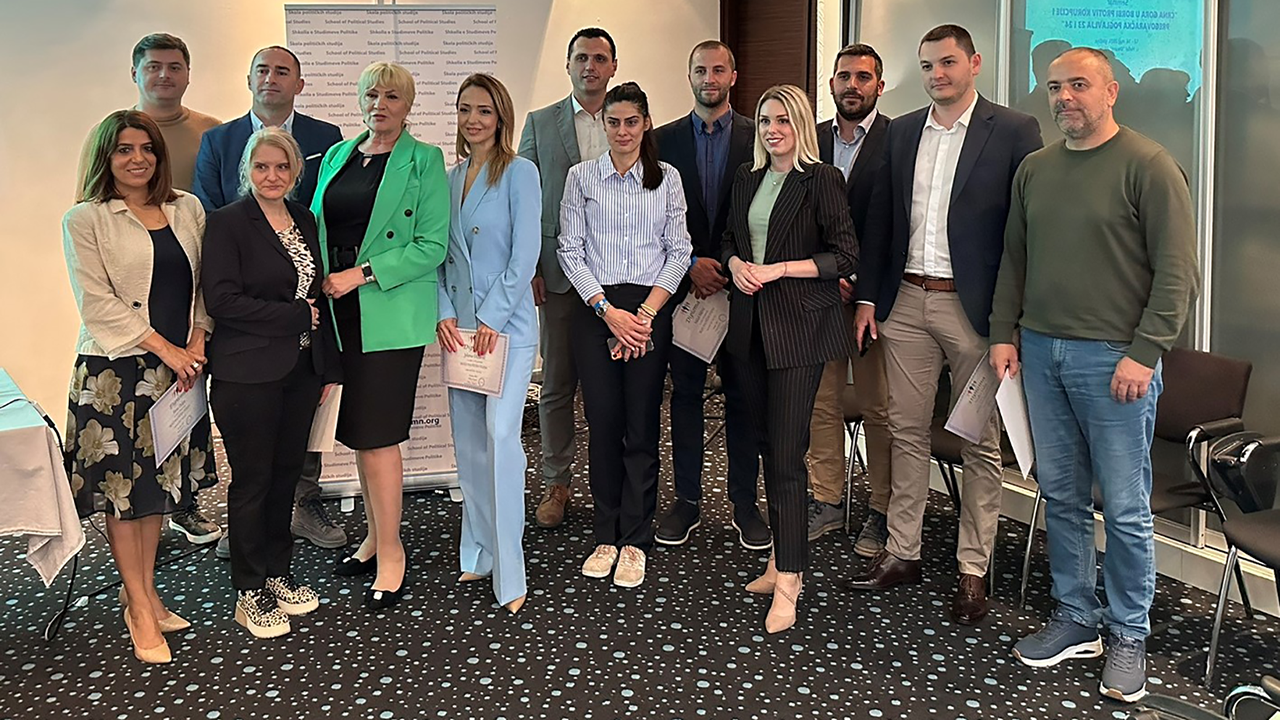FINAL SEMINAR OF THE XX GENERATION OF SPS HELD IN MAY
The School of Political Studies organized a seminar entitled “Montenegro in the fight against corruption and negotiating chapters 23 and 24”, held from 12 to 14 May. This seminar was also the final activity within the program created for the XX generation of SPS.
During the opening ceremony, the seminar participants were addressed by Mr. Omer Barjaktari, Mayor of Ulcinj, Mr. Genci Nimanbegu, member of the Parliament of Montenegro, Ms. Lejla Dervišagić, head of the Program Office of the Council of Europe in Podgorica, and Mr. Milan Radović, Director of the School of Political Studies.
In their addresses they sent a clear message about the importance of EU integration, especially in chapters 23 and 24. Ms. Dervišagić particularly emphasized the importance of whistleblowers and their role in exposing corruption. She pointed to the need to harmonize the Law on the Prevention of Corruption with Directive (EU) 2019/1937 of the European Parliament and of the Council of 23 October 2019 on the protection of persons who report violations of EU rights, and recommended, inter alia, that the issue of whistleblowers be addressed by a special law. Mr. Branislav Radulović, Ph.D., also addressed the participants during the introductory lecture. He highlighted the importance of budget control, but also control of public finances, noting that the issue of institutional responsibility is imperative for the normal functioning of the public system. In his presentation, he referred to the role of the State Audit Institution – its preventive, control and advisory role, presenting concrete examples from practice.
Mr. Momčilo Radulović, head of the Council of the Agency for the Prevention of Corruption (APC), opened the second day of the seminar with a presentation on accountability in the public finance system and proactivity of institutions in the fight against corruption, with a special emphasis on the role and importance of whistleblowers. He discussed the work of APC and challenges in the past period, as well as the need to amend the Law on the Prevention of Corruption and other relevant laws so as to expand the jurisdiction of APC and strengthen its position, which would lead to even better results in the fight against corruption in the future. In his presentation, Mr. Radulović also addressed the status of whistleblowers, and pointed out that recently an increasing number of citizens have been reporting corruption to APC.
Mr. Vukas Radonjić, prosecutor in the Special State Prosecutor’s Office, also addressed the participants, speaking on the topic of the fight against high corruption and challenges faced by the Special State Prosecutor’s Office in this area, as well as the regulations applied in his daily work. Mr. Radonjić referred to the importance of cooperation with both state and international institutions, and explained the role of the institute of collaborative witnesses and undercover investigators, as well as secret surveillance measures as essential for initiating proceedings. H.E. Mr. Veselko Grubišić, Ambassador of the Republic of Croatia in Montenegro, concluded the second day of the seminar. Mr. Grubišić shared Croatia’s valuable experience as an EU member state. He explained how important it is to clearly define public policy, in order to properly face the obstacles on the path to the EU.
On the third day of the SPS seminar, participants were addressed by Mr. Milan Žugić, editor at the MINA agency, and Mr. Marko Vešović, editor of the RTCG portal. Mr. Žugić spoke about a series of conditions that should be created in order for journalists to engage in investigative journalism, and how to use the Law on Free Access to Information. Mr. Vešović emphasized the importance of solving the cases of attacks on journalists and the murder of editor-in-chief of the Dan newspaper, Duško Jovanović.
The lecturers pointed out the need for better cooperation of investigative journalists with international organizations and funds ready to finance such projects, so that journalistic investigations can be carried out in a proper manner. According to them, the Fund for Media Pluralism can significantly contribute to the quality work of investigative journalists, but also the expected amendments to the media laws.
At the end of the seminar, diplomas were awarded to the participants of the XX generation of the School of Political Studies.







